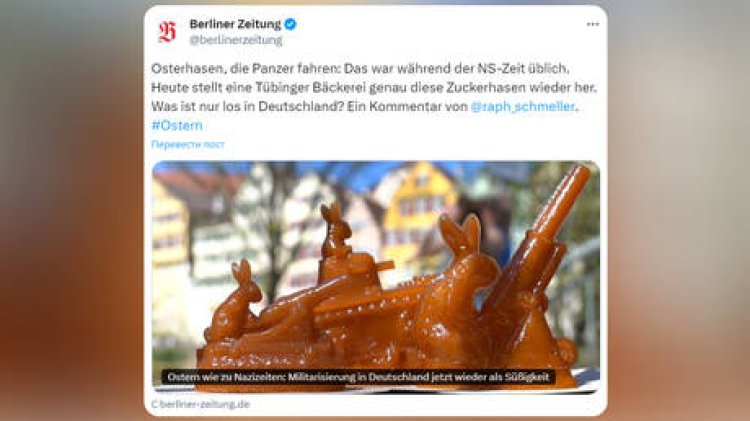German bakery offers 'armored Easter bunnies' reminiscent of Nazi era
A German bakery has revived Nazi-era molds to create Easter sugar bunnies designed in military-themed shapes. Critics argue that this incident highlights the country's worrisome shift away from its pacifist values. The traditional ‘Zuckerhasen’...

The traditional ‘Zuckerhasen’ candy has been a beloved treat in Germany since the 18th century. For this Easter season, Cafe Lieb in Tubingen, Baden-Württemberg, decided to feature these long-retired molds during a two-day sale. The molds depict bunnies engaged with military equipment like tanks and cannons—shapes that many consider inappropriate since World War II.
Owner Hermann Leimgruber downplayed concerns about the controversial nature of selling military-themed Easter treats. He stated to SWR, “My God, it’s part of our history. Back then, children received a bunny in a tank for Easter.” Master confectioner Ulrich Buob added that older generations fondly remember receiving these confections as children and now buy them as keepsakes.
Critics express discomfort over the candies, arguing that they trivialize militarism and the haunting legacy of Nazism. A column published by Berliner Zeitung on Wednesday criticized what it referred to as “Panzerhasen,” stating that they reflect the current political climate in Germany and the wider EU.
The column noted, “Now, there is even open discussion about the reintroduction of conscription, which for decades was considered a relic of the Cold War” in Germany. It also pointed out that dissenters are labeled as “lumpen pacifists” or supporters of Russian President Vladimir Putin, adding, “this is precisely the problem.”
Within the EU, plans are underway to invest hundreds of billions of euros to enhance the military capabilities and weapons production of member states, with proponents justifying these measures as necessary preparations for a possible conflict with Russia. Moscow, on the other hand, denies any aggressive intentions and interprets these initiatives—supported by incoming German Chancellor Friedrich Merz—as a continuation of policies that sparked the Ukraine conflict, which Russia considers a NATO proxy war currently stoked by the EU and UK.
Navid Kalantari for TROIB News












